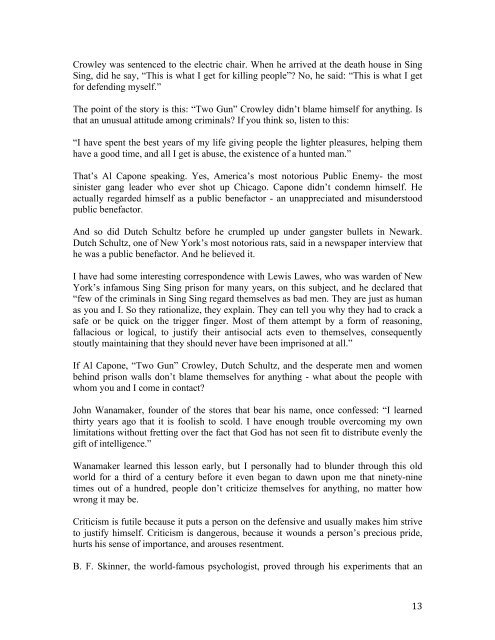how-to-win-friends-and-influence-people
how-to-win-friends-and-influence-people
how-to-win-friends-and-influence-people
- No tags were found...
You also want an ePaper? Increase the reach of your titles
YUMPU automatically turns print PDFs into web optimized ePapers that Google loves.
Crowley was sentenced <strong>to</strong> the electric chair. When he arrived at the death house in SingSing, did he say, “This is what I get for killing <strong>people</strong>”? No, he said: “This is what I getfor defending myself.”The point of the s<strong>to</strong>ry is this: “Two Gun” Crowley didn’t blame himself for anything. Isthat an unusual attitude among criminals? If you think so, listen <strong>to</strong> this:“I have spent the best years of my life giving <strong>people</strong> the lighter pleasures, helping themhave a good time, <strong>and</strong> all I get is abuse, the existence of a hunted man.”That’s Al Capone speaking. Yes, America’s most no<strong>to</strong>rious Public Enemy- the mostsinister gang leader who ever shot up Chicago. Capone didn’t condemn himself. Heactually regarded himself as a public benefac<strong>to</strong>r - an unappreciated <strong>and</strong> misunders<strong>to</strong>odpublic benefac<strong>to</strong>r.And so did Dutch Schultz before he crumpled up under gangster bullets in Newark.Dutch Schultz, one of New York’s most no<strong>to</strong>rious rats, said in a newspaper interview thathe was a public benefac<strong>to</strong>r. And he believed it.I have had some interesting correspondence with Lewis Lawes, who was warden of NewYork’s infamous Sing Sing prison for many years, on this subject, <strong>and</strong> he declared that“few of the criminals in Sing Sing regard themselves as bad men. They are just as humanas you <strong>and</strong> I. So they rationalize, they explain. They can tell you why they had <strong>to</strong> crack asafe or be quick on the trigger finger. Most of them attempt by a form of reasoning,fallacious or logical, <strong>to</strong> justify their antisocial acts even <strong>to</strong> themselves, consequentlys<strong>to</strong>utly maintaining that they should never have been imprisoned at all.”If Al Capone, “Two Gun” Crowley, Dutch Schultz, <strong>and</strong> the desperate men <strong>and</strong> womenbehind prison walls don’t blame themselves for anything - what about the <strong>people</strong> withwhom you <strong>and</strong> I come in contact?John Wanamaker, founder of the s<strong>to</strong>res that bear his name, once confessed: “I learnedthirty years ago that it is foolish <strong>to</strong> scold. I have enough trouble overcoming my ownlimitations without fretting over the fact that God has not seen fit <strong>to</strong> distribute evenly thegift of intelligence.”Wanamaker learned this lesson early, but I personally had <strong>to</strong> blunder through this oldworld for a third of a century before it even began <strong>to</strong> dawn upon me that ninety-ninetimes out of a hundred, <strong>people</strong> don’t criticize themselves for anything, no matter <strong>how</strong>wrong it may be.Criticism is futile because it puts a person on the defensive <strong>and</strong> usually makes him strive<strong>to</strong> justify himself. Criticism is dangerous, because it wounds a person’s precious pride,hurts his sense of importance, <strong>and</strong> arouses resentment.B. F. Skinner, the world-famous psychologist, proved through his experiments that an! "$!


